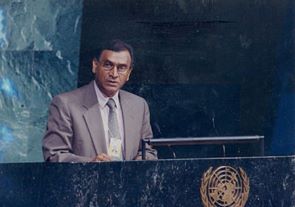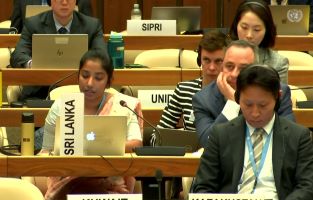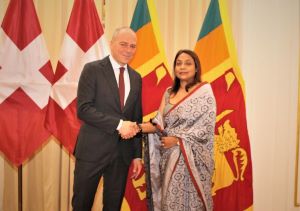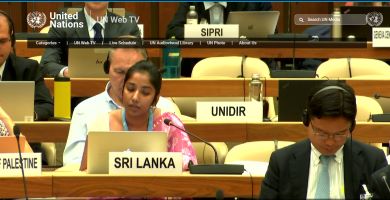Addressing the National Law Conference yesterday (03), President Wickremesinghe said that Sri Lanka’s next country assessment on Anti-Money Laundering and Countering the Financing of Terrorism will commence soon. The assessment, slated to commence soon, holds immense significance as it directly impacts the country’s ease of doing business rating and its ability to attract foreign investments.
In an important development, Sri Lanka has been informed about the impending country assessment on anti-money laundering and countering the financing of terrorism. This assessment holds significant weight as Sri Lanka’s compliance in these areas is crucial for enhancing the ease of doing business rating and attracting foreign investments.

The Ministry of Foreign Affairs learns with deep sorrow of the passing away of eminent Sri Lanka Foreign Service officer Deshamanya Jayantha Dhanapala and conveys its profound condolences to his family.
The late Mr. Dhanapala joined the Sri Lanka Foreign Service in 1965 and had a distinguished career as a public servant during which he served his country with integrity, dedication and the highest professionalism which has inspired succeeding generations of Foreign Service officers.
In his Foreign Service career, he served in Sri Lanka Missions in Beijing, New Delhi and London and as Ambassador and Permanent Representative to the United Nations in Geneva and as Ambassador to the United States. He was also Additional Secretary of the Ministry of Foreign Affairs. He also served as Secretary General of the Secretariat established to Co-ordinate the Peace Process in Sri Lanka and as Senior Advisor to the President of Sri Lanka.
Intervention on the revised draft
Mr. Chair
Thank you very much for sharing this new draft.
Even though many delegations in this room argued for strengthening of the text in order to ensure that centrality of human control is retained in AWS in order to ensure compliance with international law and IHL in particular, we are quite concerned that the text in several ways is now even further weakened to the extent that we run the risk of even previously agreed understandings are backtracked. Our concerns are mainly with paragraph 20 such as deletion of the word ‘anticipation. Which we believe is already an IHL requirement as well as concerns regarding para 21 in this regard.
Adoption of a substantive repot is important for our delegation as much as it is the same for other delegations but we believe that it should be progressive and forward looking in nature.

Thank you Mr. Chair,
Our comments at this point are with regard to paragraph 25 on legal review. It is the understanding of our delegation that legal reviews with regard to autonomous weapon systems should be inline with the already existing obligations under Art. 36 of the Additional Protocol I and that we should not in anyway agree to obligations on legal review for autonomous weapon systems that are weaker than the already existing obligations under Art,36. It is also recalled that most provisions of the Additional Protocols have gained the status of customary international law. We also note that the obligation under Art 36 of the Additional Protocol I finds its basis in article 35 of the Protocol which provides that the right of states to choose means and methods of warfare is not unlimited.
Art. 36 requires to determine whether the employment of weapons, means and methods of warfare would, ‘in some or all circumstances’ be prohibited by international law. In this sense we believe that the legal review process should consider whether the use of an AWS is in compliance with international law “ in some or all circumstance” and we therefore suggest to make this change in the text. We also support the suggestion by the Swiss delegation as well the delegation of Ireland now to delete the words “ seek to” in this section.

The 2nd Experts Meeting on the Migration Partnership between Sri Lanka and Switzerland was held on 16 May 2023 at the Ministry of Foreign Affairs. The meeting was co-chaired by Director General/Europe & North America the Ministry of Foreign Affairs of Sri Lanka Shobini Gunasekera, and Ambassador Vincenzo Mascioli Director of International Affairs, State Secretariat for Migration (SEM), Federal Department of Justice and Police (FDJP) of Switzerland.
The meeting reviewed the progress made under the Migration Partnership since its launch in 2016 and discussed the priorities and challenges for the future. The two sides reaffirmed their commitment to enhancing bilateral cooperation on migration issues. They also exchanged views on current migration trends, developments, and avenues for promoting employment opportunities in Switzerland for skilled workers from Sri Lanka. Both sides agreed to explore possible future cooperation in the hospitality sector, especially sustainable tourism and also in the fields of vocational training, skills development and sustainable reintegration.

With regard to paragraph 21 on limitations we would like to state at the outset that in our view the purpose of the imposition of these limitations is to ensure ‘ meaningful human control’ in weapon systems on the premise that autonomy in weapon system cannot be unlimited. We do not agree with the argument that the limitations imposed during the stages of development, deployment and use go beyond the existing IHL requirements. To the contrary these limitations are essential to ensure meaningful human control is retained in weapon systems which would be the only way to ensure in turn that these weapon systems in compliance with IHL.
The chapeau of paragraph 21 should refer to international law and to IHL in particular since complexity of these weapon systems pose a challenge not only to IHL but to the broader regime of international law. We also request to remove the qualifier ‘where appropriate’ in this section as these limitations should be upheld at all times. We stress once again the importance of these limitations as well as the prohibitions with regard to autonomous weapon systems codified in the form of a binding legal instrument to ensure their compliance rather than “possible voluntary measures” left for the discretionary implementation of national mechanisms.

As this is the first time my delegation takes the floor, we wish to congratulate you and assures you of our full support as we approach the final stage of this year’s GGE which we believe marks a significant turning point on the future direction on the issue of regulation of the use of autonomy in weapon systems.
In this light we commend the significant efforts you and your team have put on in presenting the draft report of the 2023 session which we consider as a good basis to commence our work for this session.
